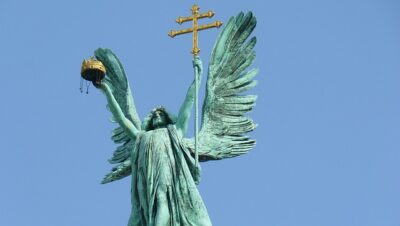 When describing the kingdoms of the past and how they functioned, it is often said that the people were deceived. They were led to believe that the king was crowned by the clergy on behalf of God. It would look bad with a crude dictator who took power through violence and corruption. No, power must come from God, and in this way the state is stabilised and no one can question its nature.
When describing the kingdoms of the past and how they functioned, it is often said that the people were deceived. They were led to believe that the king was crowned by the clergy on behalf of God. It would look bad with a crude dictator who took power through violence and corruption. No, power must come from God, and in this way the state is stabilised and no one can question its nature.
Well, people did rebel against the royal power from time to time, so they were not completely deluded. But the idea is that the bond between the ruling class and the divine created a kind of legitimacy, which trumped the right of the strong, and conferred divine sovereignty on those in power.
Perhaps this is ultimately an oriental concept, where the god-emperors had absolute power, they were the descendants of higher beings, and are worshipped by the subjects. We in the West are more used to councils and courts, with certain groups having power, rather than individuals. Aristocratic government has been successful in Europe, and often our kingdoms were heavily influenced by the aristocratic system, with the king being the foremost of aristocrats, but also replaceable.
In any case, the idea of being chosen and ruling by God’s mandate is a powerful image, and it often figures in our historical imagination.
Let us contemplate this. If one person can gather an army of thousands of soldiers, equipped with weapons, shields, armour and horses. It takes skilled armourers, engineers to build throwing machines and battering rams, and architects to create fortifications. Add to that horsemen, porters, vassals and cooks. The business is partly supported by the subjects who pay a tithe to the sovereign (which is very low given the current tax burden). And this takes place in a violent and competitive society, where hunger and disease are at arm’s length.
If the person in question can maintain the system, without being stabbed in the back, poisoned or otherwise having an accident – then he can probably be considered chosen by God, and actually get away with it. And the system he built, to make the intricate machinery work, can rightly be considered divine. And the respect the king enjoyed from his subjects was probably genuine, because they understood how he built his empire.







